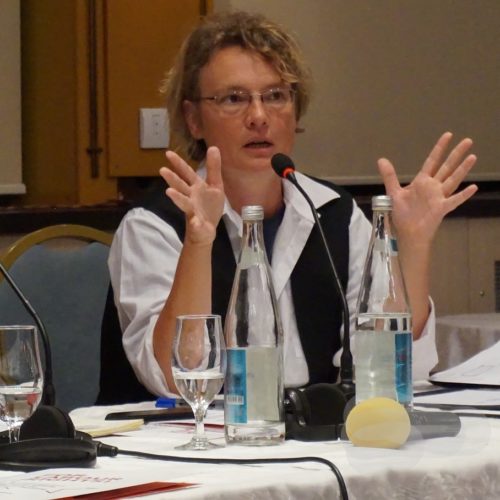Debate on Covid-19
What kind of individual responsibility
against the Covid-“war”?
31st of July, 2020

Maria Markantonatou
The French philosopher Jean Baudrillard characterized September 11 as the “absolute event”[1], and ever since “absolute events” in the framework of various crises have become typical of the 21st century. The events are described as “war” and attributed to an “invisible threat”: Market speculative attacks in the 2008 financial crisis, so called terrorist attacks, and, recently, Covid-19 were labeled as “invisible threats” without much explanation of the underlying socio-economic causes. Medical and economic discourses are often merged, irresponsible individuals or individual countries are blamed, and “therapy” becomes urgent. For instance, as A. Gurría, OECD’s Secretary-General, had put it for the Greek crisis[2], “this [the Greek crisis] is like Ebola. When you realise you have it, you have to cut your leg off in order to survive”.
A decade after the outbreak of an Ebola-like economic crisis, the Covid-19 crisis broke out. The Greek right-wing government of Nea Demokratia, which was newly elected with a program of liberalization and privatizations combined with “law and order” politics, implemented a strict lockdown together with increased surveillance and policing as well as an intensive mass media campaign to persuade people to comply with the restrictive measures (“Stay Home” campaign).
From 12.03.2020, when the lockdown begun, until 04.05.2020, when it was gradually lifted, everyday at 18.00 o’ clock, the Greek TV-audience watched a team of medical experts and government officials announcing numerous preventive measures and providing detailed hygienic directions. Analyzing 46 TV announcements of the team, we find a specific rhetoric emerging, especially that of “war” and “individual responsibility”. That “we are at war [with Covid]” was mentioned daily, and the dictate to show “individual responsibility” was heard more than 120 times during these 46 press releases. A new polarization emerged, the “responsible” ones (those who stayed home and followed hygienic rules) vs. the “irresponsible” ones (those who were caught outside without a reason). The former were rewarded on TV by government officials (“we are proud of the responsible ones”), and for the latter there were punishment threats: “we won’t allow any deviance from the measures and we will show zero tolerance”. Be it out of fear of another social drama as that of the previous decade or low trust to the Greek public health system, most Greeks complied with the experts’ dictates (a mixture of scientific and moralistic arguments) and accepted “responsibility”.
Polanyi was a strong advocate of “responsibility” emerging from democratic participation to economic policy and the individuals’ overview of production in a socialist framework[3]. Of course, this is not the kind of responsibility propagandized by neoliberal governments today, including the Greek one, which celebrates its campaign as a “success story” due to the comparatively low number of total cases and deaths. Τhe contribution of the lockdown in these numbers has not been sufficiently studied, but the tragic events in neighboring Italy and the awareness of the Greek hospitals’ low current capacity made it appear as the only choice for the government. What was actually promoted in Greece in the name of safety was the neoliberal responsibility of individuals to secure alone their existence, in a social setting, in which, after ten years of intensive austerity, welfare institutions have been severely deteriorated and the public health system systematically deregulated. We were never further away from a Polanyian notion of responsibility. This would require socialist directions in welfare policy and economic democracy rather than non-stop market competition and liberalization.
[1] Baudrillard, Jean, The Spirit of Terrorism, Verso, London, 2012 (translated by Chris Turner)
[2] See: Greek debt crisis: Europe feels shockwaves as bailout falters. The Guardian. 28.04.2010. Available online: https://www.theguardian.com/business/2010/apr/28/greek-debt-crisis-europe-bailout
[3] Polanyi, Karl, Über die Freiheit, 1927, Karl Polanyi Institute of Political Economy, 2-16.
Maria Markantonatou
Assistant Professor, Department of Sociology,
University of the Aegean
Lesvos, Greece
Read the other essays on the Covid-19 pandemic here:





